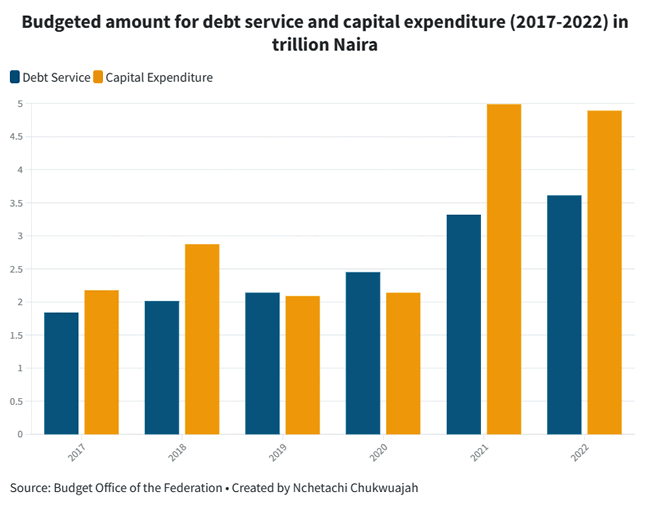
With dwindling oil revenue due to slump in the price of oil in the international market, Nigeria’s government has had to rely on borrowing, both external and domestic, to finance its projects and close up budget deficits over the years. This has caused a surging debt profile -presently at $38trn, more money to service the debts and almost equal amount as capital expenditure. NCHETACHI CHUKWUAJAH reports that this trend has implications as it hurts the country’s capacity to finance capital and other value-adding projects, while amassing the country in more debts.
When President Muhammadu Buhari came into office in 2015, he made many promises. One of which was his plan to resuscitate the economy and put it on the path of recovery and growth through viable economic policies and programmes.
“The problem we are facing today is the problem of security and the economy. We have gathered competent hands to manage the economy and tackle insecurity,” President Buhari had said.
While opinions are divided on if the president has fulfilled this promise more than six years after, funds to take on new developmental projects have tanked. And the Federal Government has blamed the dwindling revenue on issues like the COVID-19 pandemic and the low price of crude oil in the international market. As such, borrowing is the way out, the government says.
In fact, the Minister of Finance, Budget and National Planning said in August last year that the country must borrow to fund “infrastructure like power, water, roads and rails which are investments that are required to enhance business productivity in the country today.”
But there are concerns that the government has borrowed so much that paying the spiking debt would pose a great problem for the country now and in the future.
An expert like Paul Alaje, Senior Economist at SPM Professionals, believes that the continuous borrowing is unwarranted given that there are loopholes the country could block — like actually commercialising the gas the country flares — to increase its revenue.
Notwithstanding, Mrs Ahmed maintains that the country is “borrowing sensibly” and that it is still safe to borrow to fund the 2022 budget.
However, the continuous borrowing has dire consequences.
Less fund for development
Borrowed money is not free money. There is no easy hack around it. The funds have to be paid back, most times with interest. So, what this means is that as the country borrows, its debt stock keeps spiking, likewise the amount to be paid back and, by implication, the amount that would be available for infrastructural development.
Here’s how: According to data from the Debt Management Office (DMO), as of June 30, 2015, the nation’s external debt stood at $10.31bn and total public debt of $63.806bn or N12.1trn. Fast forward to 2021, the figure has almost tripled to $37.95bn for foreign debt and $92.626bn or N38.0trn for total public debt as of September 30, 2021.
This shows a 268 per cent increase — an average of 44.5 per cent per year — in external debts and a 214.0 per cent increase in total debts in six years.
In order to sustain these debts, the Federal Government spends trillions of naira yearly on debt servicing — an amount required to cover the repayment of interest and principal on a debt(s) over a period of time.
In the past five years, beginning from 2017, the President Buhari administration has spent a total of N15.375trn on debt servicing, excluding N296bn and N110bn allocated for sinking funds in 2019 and 2020.
In 2017, the sum of N1.841trn (including N177.5bn for sinking fund) was budgeted for debt service, which was 37.26 per cent of the total revenue of N4.940trn and 25.22 per cent of the total expenditure of N7.298trn.
In the 2018 budget, the Federal Government allocated N2.014trn and N190bn for debt servicing and sinking funds, respectively (totalling N2.204trn). The amount for servicing of debts represented 28.10 per cent of revenue and 22.08 per cent of expenditure.
For the 2019 fiscal year, the sum of N2.140trn was budgeted to service the federal government’s debts. This figure represented 30.57 per cent of the N7.000trn generated in the year. N110bn was budgeted as sinking fund in the same year.
In 2020, N2.450trn, which represented 30.04 per cent of generated revenue of N8.155trn, was spent on debt servicing; while N296bn was allotted as sinking fund.
The amount budgeted for debt servicing in 2021 was N3.320trn (including sinking fund), which represented 40.88 per cent of projected revenue of N8.121trn and 32.77 per cent of the N10.132trn expenditure. However, while making a public presentation and breakdown of highlights of the 2022 budget, Minister of Finance, Budget and National Planning, Zainab Ahmed, said N2.89trn was spent on debt service between January and August 2021. This shows that 74 per cent of the N3.93trn generated by the Federal Government within the period was spent on servicing debts.
Zainab also disclosed that the sum of N3.61trn would be spent on debt servicing in 2022. The amount is 22 per cent of the total expenditure of N16.391trn and 35.6 per cent of the projected total revenue of N10.132trn.
Dwindling capital expenditure
In the years under review (2017-2022), the Federal Government has budgeted a total of N19.16trn for capital expenditure — money spent to buy, maintain or improve fixed assets.
According to data from the Budget Office, in the 2017 fiscal year, the Federal Government spent N2.177trn out of N7.441trn aggregate revenue as capital expenditure. The amount represented 29.25 per cent of the total revenue in that year.
For 2018, N2.873trn was expended on capital projects, which was 31.50 per cent of N9.120trn total expenditure.
In 2019 and 2020, N2.090trn and N2.140trn, respectively, were spent as capital expenditure. The figures represented 23.43 per cent and 20.71 per cent of aggregate expenditure for the years which was N8.920trn and N10.330trn, respectively.
The amount budgeted for capital expenditure saw an increase in 2021 and 2022 as N4.989trn and N4.891trn were budgeted for capital projects. This shows 34.24 per cent and 29.83 per cent of aggregate expenditure for the years at N14.570trn and N16.391trn, respectively.
However, while presenting the 2021 budget performance, the Minister of Finance had said that N1.79trn had been spent on capital projects between January and August 2021.
Implications for Nigeria’s economy
Just as there is no easy hack to paying back debts, there are no nice ways to say that the continuously increasing amount spent on debt servicing have debilitating impacts on the economy. While the government has said that some of the debts have low-interest rates, analysts argue that if the trajectory continues, the country may not be able to service the debts or fund infrastructural projects.
But the government fires back any time this fear is expressed. The authorities rely on the fact that the debt-to-GDP ratio is still healthy at 34.3 per cent which the International Monetary Fund (IMF) puts it as of 2019, far below the 90 per cent threshold economists say it gets to before it begins to hurt economic growth.
However, the point of concern is that debt repayments are often made from revenue generation. At less than five per cent, Nigeria has one of the lowest revenue-GDP ratios in Africa.
The country makes about 65 per cent of government revenue and over 90 per cent of foreign exchange earnings from the oil sector. And, disturbingly, there are uncertainties in the global oil market and revenue growth has been sluggish. When the negative impacts of COVID-19 on the economy are factored in, there would be concerns that the country would face challenges generating enough revenue to service its debt, wrote Stephen Onyeiwu, a Professor of Economics at the Allegheny College.
It is a source of concern for stakeholders in the country too.
ActionAid Country Director, Ene Obi, at a tax summit organised by the Tax Justice and Governance Platform Nigeria, decried that in the last couple of years, Nigeria’s revenue projection has become unattainable and unable to meet the deteriorating situation in the country as 40 per cent of Nigerians are still living below the poverty line.
“The direct implication is that any additional money that the government spends is from additional borrowing; so what it means is that the borrowing will increase. And because I do not see any serious programme to trim or moderate expenditure, it means we are going to be borrowing to the quantum of our budget projections.
“We are in serious trouble in the country because our debt is not sustainable at the moment. This has been said time and time again; we shouldn’t be borrowing for consumption unless we see expanded taxes.
“That is really how you can pay off those debts, but when we are not focusing on production but are still looking to favour revenues, we plunge ourselves into huge problems of servicing the debt,” said Professor Pat Utomi, in an interview with Punch newspaper in June 2021.
For Adeola Adenikinju, a professor of Economics at the University of Ibadan, the trend could pose a serious challenge for financing capital projects and discourage private sector investment.
“If all our revenue is going to the servicing of debt, it means we have major fiscal problems which we need to solve.
“Another implication is we have to borrow to meet recurrent expenditure and any capital expenditure. We have to borrow through deficit financing, which an economist would know that depending on how you source for the deficit, it could be inflationary.
“It could also discourage private investment. It is not a good time for us as a country; we need to find a way of increasing our revenue base,” Prof. Adenikinju said.
The Chief Executive Officer (CEO) of Financial Derivatives Company, Bismarck Rewane said for the trend to be reversed, the Federal Government must strive to increase revenue and productivity.
“What we are paying as debt service is interest payment. Revenue is frail because of the pandemic, while debt service has increased.
“It is worrying if we are spending so much on debt servicing without getting an increase in productivity, which is key.
“Productivity rates are low while debt servicing is increasing. Two things have to happen, revenue has to increase, and productivity must increase. That is critical,” he said.
YOU SHOULD NOT MISS THESE HEADLINES FROM NIGERIAN TRIBUNE
We Have Not Had Water Supply In Months ― Abeokuta Residents
In spite of the huge investment in the water sector by the government and international organisations, water scarcity has grown to become a perennial nightmare for residents of Abeokuta, the Ogun State capital. This report x-rays the lives and experiences of residents in getting clean, potable and affordable water amidst the surge of COVID-19 cases in the state.
WATCH TOP VIDEOS FROM NIGERIAN TRIBUNE TV
- Let’s Talk About SELF-AWARENESS
- Is Your Confidence Mistaken for Pride? Let’s talk about it
- Is Etiquette About Perfection…Or Just Not Being Rude?
- Top Psychologist Reveal 3 Signs You’re Struggling With Imposter Syndrome
- Do You Pick Up Work-Related Calls at Midnight or Never? Let’s Talk About Boundaries






